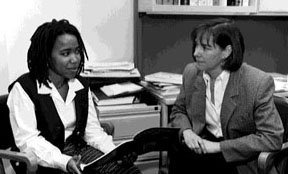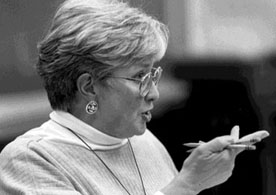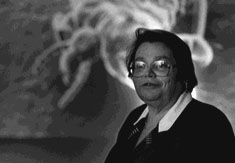A Passion for Teaching
June 22, 1997
What enables a teacher of nursing to "touch our human feelings"--to get
not only facts and figures across but also to inspire her students to excel?
According to the criteria for the nursing school's Teaching Scholar Award, given for the first time last year, the answer lies in a combination of commitment, innovation, and scholastic rigor. Initiated by Dean Dyanne D. Affonso and the nursing school administration, the award is one way the school is giving superb teaching the prominence it deserves.
The Teaching Scholar Award is a monetary gift that will be given annually to faculty members who best exemplify excellence in teaching scholarship, as demonstrated by creativity in the selection and organization of learning experiences, the recognition of the unique contributions students make to the educational process, and the creation of interdisciplinary bridges that connect nursing knowledge to other academic disciplines.
"Faculty who receive Teaching Scholar Awards are inspiring role models," says Associate Dean Margaret Parsons. "They challenge both faculty and students to tackle activities that improve health care for society, they demonstrate accountability through their professional activities, and they serve as mentors and advocates. Our first recipients, Debbie Ryan, Dr. Marianne Scharbo-DeHaan, and Dr. Sarah Freeman, meet and exceed all those requirements."
Knowledge, passion, and inspiration

"You have to help students learn through their own
experiences," says Debbie Ryan (at right), who mentors student Imani Bivens.
The teacher who supervised my classroom and clinical teaching in nursing education was
a wonderful teacher and role model," says Debbie Ryan, who created the nursing school's new mentoring program. "Her teaching skills and her encouragement of my personal development inspired me to become a nurse educator."
Ryan, whose area of specialty is children's health, teaches undergraduates, students in the RN-MSN bridge program, and the Taiwanese students in the Nursing Education Partnership Program.
What qualities does she believe make for an outstanding teacher?
"You have to help students learn through their own experiences," she says. "You also must be
current in content, have a passion for the profession of nursing, and have an ability to inspire students to reach further and accept challenges."
Teachers are also role models, she says: "Nursing is a practice discipline, and students learn a great deal when they see how their teacher interacts in a clinical environment."
Ryan says her goal is to be "actively involved with designing and implementing a nursing curriculum that meets the needs of the next century. I want to provide educational experiences that assist students in developing leadership qualities, integrity, and an ethical foundation as they assume the responsibilities of the profession."
Valuing the process as well as the product

Marianne Scharbo-DeHaan has organized faculty
workshops that are designed, she says, "to develop instructional approaches that transform students
from passive listeners to active learners."
I like clinical practice, and I especially enjoy
teaching my patients," says Marianne Scharbo-DeHaan, PhD, an associate professor in the nurse midwifery program who also teaches courses in research and women's health. "Teaching students grew out of that. It was an evolutionary process.
"I believe a good teacher must value the process of learning as well as the product," she says. "I've always been interested in a pedagogy that is less hierarchical than traditional models, one that does not presume the teacher has all the facts. Graduate students in particular bring experience and knowledge to the learning experience that need to be
valued and appreciated."
Among Scharbo-DeHaan's professional interests are developing strategies to deal with the changing health care system from a nursing perspective and researching innovative ways to teach. "Reform efforts in both health care and higher education have necessitated major revisions in virtually every aspect of nursing education," she says. "It's important that faculty work on the development of innovative instructional strategies. For example, we need to use active learning to enhance students' creative and critical thinking skills."
Teaching from personal experience

Sarah Freeman will teach an interdisciplinary ethics course in the spring of 1998 that will challenge students "to analyze the interface of nursing, theology, politics, and law as they relate to health care decision-making."
A special high school teacher made a tremendous difference in my life," says Sarah Freeman, PhD, coordinator of the family nurse practitioner program and ethics teacher. "While
I wanted to be a nurse, I also wanted to have that kind of impact. By teaching nursing, I have found
a way to do both."
A nurse practitioner since 1973, Freeman believes faculty who teach clinical courses should maintain a clinical practice. "Clinical competence gives you credibility," she says.
There's another key component to being an outstanding teacher, she adds with a laugh: "You have to keep your students awake! I use a lot of humor when I teach. If you present material in an interesting way, students will learn. And it keeps them interested when you can draw on your own experiences. So I teach from personal experience--which is another reason clinical practice is important."
What does the future hold for this Teaching Scholar?
"I'll continue my teaching, and I'm doing research to support the type of teaching I do--especially research into ethics. With the changes in the way health care is being delivered, coupled with our aging society, ethics is probably one of the most critical areas for nursing educators to focus on."
Reprinted from Emory Nursing, Spring 1997
For more general information on The Robert W. Woodruff Health
Sciences Center, call Health Sciences News and Information at
404-727-5686, or send e-mail to
hsnews@emory.edu.
DIRECTORY
| SEARCH |
WEB INFO |
INDEX |
WHAT'S NEW
EMORY |
WHSC |
NEWS AND INFORMATION |
PUBLICATIONS
TABLE OF CONTENTS
Copyright ©Emory University, 1997. All Rights Reserved.
Send comments to
whscweb@emory.edu



